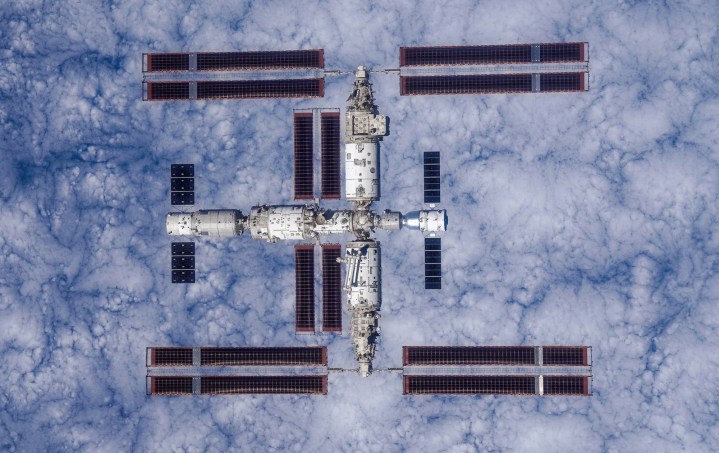
Crew members aboard China’s space station have successfully completed repairs after a debris strike caused a partial power failure at the facility, officials of the China Manned Space Agency (CMSA) revealed at a press conference on Wednesday.
The space junk struck power cables linked to the core module’s solar wings and was repaired by taikonauts during two spacewalks at the Tiangong space station, the most recent of which took place at the start of last month.
The crew is set to return to Earth on April 30 after handing over station operations to the incoming Shenzhou-18 crew, state media reported.
The CMSA has been working to optimize the procedures for space collision warning and avoidance, and has reduced the false alarm rate by 30%, agency officials said. In a further measure to improve safety, the high-definition camera on Tiangong’s robotic arm, together with the hand-held cameras used by the taikonauts during spacewalks, will be used to carefully inspect the status of the station’s exterior to check for any strikes and to analyze the mechanism of small debris impacts.
China’s space station orbits around 280 miles above Earth, about 30 miles above the International Space Station. This places both facilities in near-Earth orbit where most hazardous space junk exists.
Space debris comprises decommissioned satellites, spent rockets parts, and a huge number of tiny fragments that have resulted from random collisions involving these objects. They travel around at Earth at tremendous speed and therefore any strike on either space station has the potential to cause serious damage.
Operators of both orbital facilities have systems in place to monitor the larger pieces of junk and if one is deemed to be on course to collide with a station, the facility is moved to a higher or lower orbit to avoid it.
In a dramatic incident in 2021, crew members aboard the ISS were ordered to shelter in their spacecraft when a cloud of hazardous space junk — created by a Russian antimissile test that destroyed an old satellite — came alarmingly close to the station. Fortunately, the ISS managed to avoid any damage and the crew were allowed to return to normal duties.
With more space junk appearing all the time, a number of companies have been exploring different ways to clear it up to make near-Earth orbit operations safer not only for the space stations, but also for functioning satellites that power vital services back on the ground..
Editors’ Recommendations

